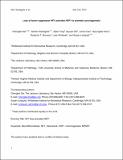Loss of tumor suppressor NF1 activates HSF1 to promote carcinogenesis
Author(s)
Dai, Chengkai; Santagata, Sandro; Tang, Zijian; Shi, Jiayuan; Cao, Junxia; Kwon, Hyoungtae; Bronson, Roderick T.; Whitesell, Luke; Lindquist, Susan; ... Show more Show less
DownloadDai, Chengkai, et al. -Loss of Tumor Suppressor Nf1 Activates Hsf1 to Promote Carcinogenesis.- JCI 122(2012)3742-54..pdf (18.96Mb)
OPEN_ACCESS_POLICY
Open Access Policy
Creative Commons Attribution-Noncommercial-Share Alike
Terms of use
Metadata
Show full item recordAbstract
Intrinsic stress response pathways are frequently mobilized within tumor cells. The mediators of these adaptive mechanisms and how they contribute to carcinogenesis remain poorly understood. A striking example is heat shock factor 1 (HSF1), master transcriptional regulator of the heat shock response. Surprisingly, we found that loss of the tumor suppressor gene neurofibromatosis type 1 (Nf1) increased HSF1 levels and triggered its activation in mouse embryonic fibroblasts. As a consequence, Nf1[superscript –/–] cells acquired tolerance to proteotoxic stress. This activation of HSF1 depended on dysregulated MAPK signaling. HSF1, in turn, supported MAPK signaling. In mice, Hsf1 deficiency impeded NF1-associated carcinogenesis by attenuating oncogenic RAS/MAPK signaling. In cell lines from human malignant peripheral nerve sheath tumors (MPNSTs) driven by NF1 loss, HSF1 was overexpressed and activated, which was required for tumor cell viability. In surgical resections of human MPNSTs, HSF1 was overexpressed, translocated to the nucleus, and phosphorylated. These findings reveal a surprising biological consequence of NF1 deficiency: activation of HSF1 and ensuing addiction to this master regulator of the heat shock response. The loss of NF1 function engages an evolutionarily conserved cellular survival mechanism that ultimately impairs survival of the whole organism by facilitating carcinogenesis.
Date issued
2012-09Department
Massachusetts Institute of Technology. Department of Biology; Whitehead Institute for Biomedical ResearchJournal
Journal of Clinical Investigation
Publisher
American Society for Clinical Investigation
Citation
Dai, Chengkai, Sandro Santagata, Zijian Tang, Jiayuan Shi, Junxia Cao, Hyoungtae Kwon, Roderick T. Bronson, Luke Whitesell, and Susan Lindquist. “Loss of Tumor Suppressor NF1 Activates HSF1 to Promote Carcinogenesis.” J. Clin. Invest. 122, no. 10 (October 1, 2012): 3742–3754.
Version: Author's final manuscript
ISSN
0021-9738
1558-8238